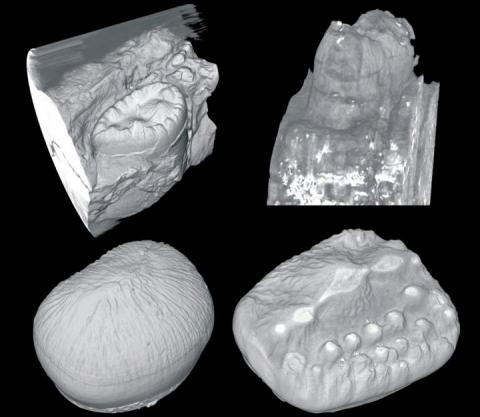However, we do have relatively thick enamel on our teeth, which can get ruined over time without proper care.
Crocodiles don't even have that. They have thin tooth enamel, the opposite of humans and other hard-biting species, as their plant-eating ancestors did. But unlike humans, when their teeth go bad, they seem to just grow new ones.

Fossilized crocodile teeth. Image: University of Missouri
By using a three-dimensional x-ray scanner to measure the thickness of tooth enamel in crocodiles, the scholars found regardless of tooth position (incisor, canine, molar), age, or diet, crocodiles lack thick tooth enamel. Published data on dinosaur teeth found that the data nearly matched what they were seeing in crocodiles. For instance, a Tyrannosaurus rex has the same enamel thickness as a crocodile and can also bite extremely hard.
"Crocodiles bite really hard, so we were curious if they have teeth that correspondingly withstand those forces -- tough teeth to match a tough bite," said Kaleb Sellers, a postdoctoral fellow in the School of Medicine at the University of Missouri and lead researcher on the study. "We found that they don't have tough teeth, and we think it's because they replace their teeth like most other non-mammal animals. That made us wonder if other animals -- even prehistoric -- had similar issues."
Like many things in evolution, the "why" of adaptation is not always a straight line. If ancient crocodiles were chewing plants, did their new teeth already have the correct architecture -- dimples and facets -- to allow for this chewing?
"Once we unlock genetically how crocodiles and other non-mammals do this, maybe new teeth can be bioengineered for people," said Brianne Schmiegelow, dental student at University of Missouri-Kansas City. "Instead of using fillers such as crowns, people could instead 'grow' new teeth when they need to replace their worn out chompers."
Researchers said the next step is to study tooth replacement and the timing of teeth growth in crocodiles and other animals such as dinosaurs -- even looking into the possibility of genetic causes.





Comments